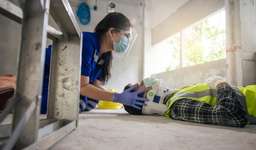
First aid at Works including Burns
Cost: £6.00
Welcome to our First aid at Works including Burns online Training. Upon completion, you will receive a certificate of completion. The course duration is approximately 1 hour and will earn you 1 CPD point. You have 6 months from the date of purchase to finish this training.This module covers various topics related to First aid at Works including Burns online training module:
1. Introduction to first aid:
• Importance of first aid knowledge in a healthcare setting
• Legal requirements and responsibilities
2. Basic life support (BLS):
• CPR techniques for adults, children, and infants
• Use of automated external defibrillators (AEDs)
• Recovery position
3. Management of common medical emergencies:
• Choking
• Seizures
• Anaphylaxis (allergic reactions)
• Asthma attacks
• Heart attacks
• Stroke
4. Wound care and bleeding control:
• Assessment and management of different types of wounds (e.g., cuts, abrasions, punctures)
• Techniques for controlling bleeding (e.g., direct pressure, elevation, tourniquets)
5. Burns and scalds:
• Classification of burns (e.g., first-degree, second-degree, third-degree)
• Assessment and initial management of burns
• First aid measures for burns and scalds (e.g., cooling the burn, covering with a sterile dressing)
6. Fractures and musculoskeletal injuries:
• Recognizing and immobilizing fractures
• Techniques for splinting and supporting injured limbs
7. Medical equipment and devices:
• Safe use and handling of medical equipment (e.g., oxygen cylinders, suction devices)
8. Incident reporting and documentation:
• Importance of accurate and timely reporting of incidents
• Proper documentation of first aid interventions
9. Communication and teamwork:
• Effective communication during emergencies
• Collaborating with other healthcare professionals and emergency services.
The learning outcomes are:
1. Understanding the importance of first aid knowledge in a healthcare setting and recognizing the legal requirements and responsibilities associated with providing first aid.
2. Demonstrating proficiency in performing basic life support (BLS) techniques such as CPR for adults, children, and infants, and effectively using automated external defibrillators (AEDs).
3. Acquiring knowledge and skills to manage common medical emergencies encountered in healthcare settings, including choking, seizures, anaphylaxis, asthma attacks, heart attacks, and strokes.
4. Demonstrating competence in assessing and managing different types of wounds, including proper wound care techniques and bleeding control measures.
5. Identifying the classification of burns and effectively assessing and providing appropriate first aid measures for burns and scalds, including cooling the burn and applying sterile dressings.
6. Understanding how to recognize and immobilize fractures and effectively provide support and splinting for musculoskeletal injuries.
7. Developing the ability to safely use and handle medical equipment and devices, and responding to equipment malfunctions or emergencies.
8. Understanding the importance of accurate incident reporting and proper documentation of first aid interventions.
9. Enhancing communication and teamwork skills during emergencies, including effective communication with other healthcare professionals and collaborating with emergency services.
We hope you find this module informative and beneficial for your professional development in First aid at Works including Burns online training module.
If you need more information about this course, please contact Train Healthcare directly at 0208 3266 704 or email contact@trainhealthcare.com.
Please note that refunds are not available for online training purchases.
Nursing and Midwife Council's (CPD Points).
Requirements:
It is necessary to complete 35 hours (35 Nursing CPD Points) of relevant CPD within the three-year period since your last registration renewal or since joining the register.
Of these 35 hours (35 Nursing CPD Points), a minimum of 20 hours (20 Nursing CPD Points), should be dedicated to participatory learning, which involves engaging in activities that facilitate interaction with other professionals.

